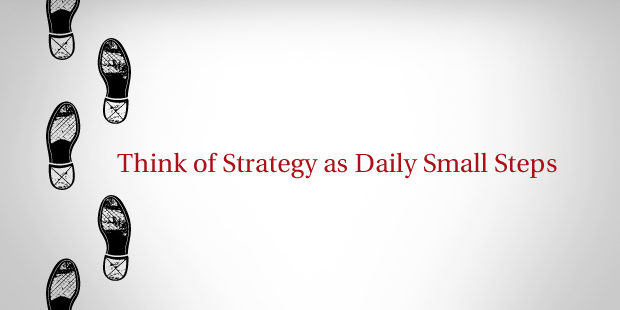
Think of Strategy as Daily Small Steps
One thing that frustrates me about the word “strategy” is that it implies something big. Sure, strategy is both important and broad reaching, but it is really nothing more than a series of steps.
It’s the things you do (and don’t do) on a daily basis that, in aggregate, impact your team’s culture, productivity, and business model. So, when it comes to executing “strategy,” we should really just dive into the details of our day-to-day.
Herein lies the problem: The more efficient we are, the more difficult it is to change the steps we take every day. Even with a big bold strategy in mind, we’re hesitant to take any unfamiliar steps in our workflow. For every decision we cite precedence, always opting for a familiar step – thus failing to charter new territory.
It is hard to take new steps because each one defies some rule or precedent for how we make day-to-day decisions.
Leaders of change recognize that a great strategy is made up of many steps that, on their own, don’t make sense and often break conventional norms. To innovate, you must advocate for and preserve the unordinary steps required to create something extraordinary.
The lesson here is that the “big idea” is the easy part. Large companies usually know where they need to go to stay on the cutting edge, but they don’t have the fortitude and flexibility to take the right steps to get there. The necessary steps are diverted by the usual steps, otherwise known as protocol. When you only take familiar steps, you don’t travel far.
A great strategy is made up of many steps that, on their own, don’t make sense.
As you seek to implement a bold new strategy, keep the following tips in mind:
- Eliminate the bias towards “precedent” when you’re building something new. New strategy warrants unprecedented action.
- Don’t let the new steps you must take be overridden by legal, branding, impatience, or other logistics. While it may seem easy to give in on the little details, any little turn off the road points you in a new direction. The only thing that should override strategy is better strategy.
- Keep reiterating “why” you’re pursuing change, and the consequences for not changing. Sometimes, especially in established businesses, the consequences of not changing are more motivating than the goals.

Tags: Scott Belsky, Strategy, Vision Frame











